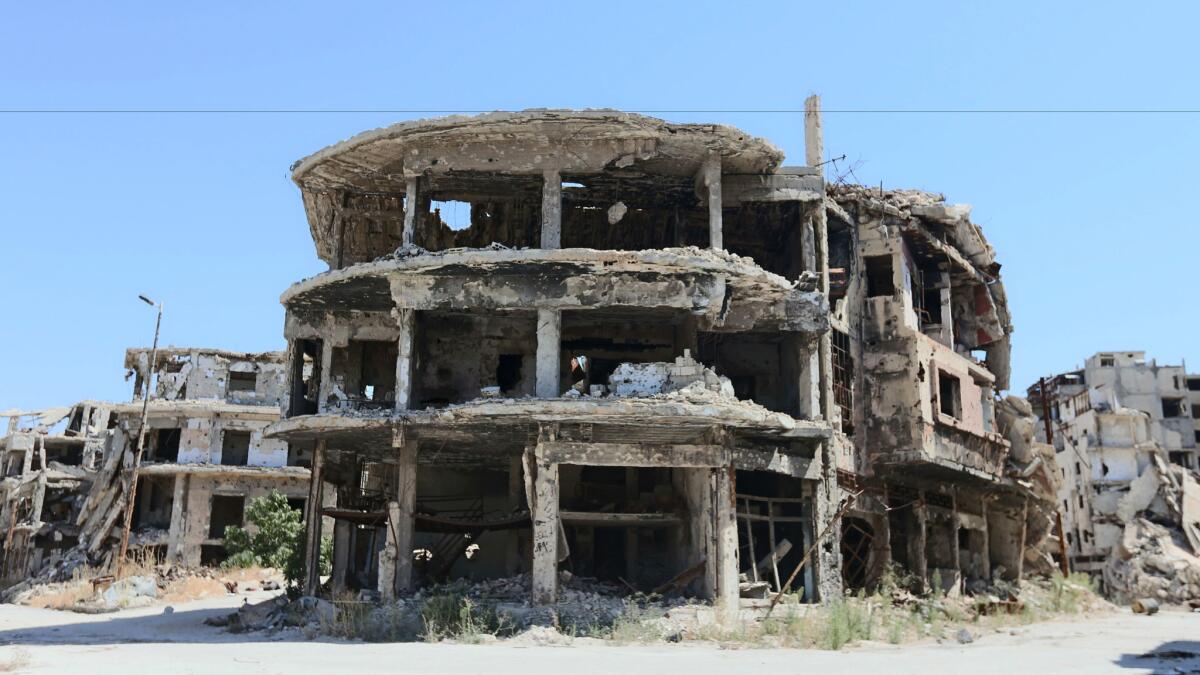Syria’s military declares end of cease-fire with rebels; aid convoy is shelled

- Share via
Reporting from Cairo — Syria’s military on Monday declared an end to the week-long cease-fire brokered by U.S. and Russian officials, blaming opposition fighters for repeated violations and launching attacks on rebel-held areas.
Before the military’s announcement, opposition fighters and activists also had accused the government of violating the cease-fire, which began at sundown Sept. 12.
Late Monday, a United Nations and Syrian Arab Red Crescent aid convoy of 31 trucks was struck while delivering relief for 78,000 people in the rural area of Urem al-Kubra, west of the city of Aleppo, according to Farhan Haq, deputy spokesman for the secretary-general of the United Nations.
Haq said at least 18 trucks were hit, though it was not immediately clear whether the damage came from an airstrike or other shelling. The shipment included food, water, sanitation supplies and other household items.
“It’s outrageous that people delivering humanitarian need should be attacked,” he said. “They had worked out with the various sides that it would be fine for them to travel at that point.”
The number of casualties could not be immediately verified, Haq and Red Crescent officials said.
In a statement earlier, the Syrian military blamed “armed terrorist groups” for repeatedly violating the cease-fire, attacking government-held areas and wasting a “real chance” to halt the more than five-year civil war.
The Syrian army said it had documented more than 300 violations of the cease-fire by rebel groups, while the Russian Ministry of Defense said 153 Syrian soldiers had been killed during the truce.
But rebel forces and activists reported 254 violations of the truce by government forces and their allies, with at least 22 civilians killed in government bombings during the past week, according to the Britain-based Syrian Observatory for Human Rights, an opposition monitoring group.
The agreement between the U.S. and Russia, a key ally of Syrian President Bashar Assad, was already complicated by apparently mistaken airstrikes Saturday that killed at least 62 Syrian troops and wounded dozens. Pentagon officials expressed regret for the airstrikes, which involved coalition Australian, British and Danish warplanes targeting Islamic State militants battling Syrian troops.
The U.N. has said the Syrian government blocked the delivery of humanitarian aid to besieged areas, a key condition of the deal. Syrian rebel groups have also accused Assad’s forces of violating the cease-fire by attacking rebel-held neighborhoods.
“There is no hope of humanitarian assistance,” said Zakariya Malahfji, head of one rebel group’s political office, in an interview with Arabi21. “Every time, there is stalling and excuses.”
He said some rebel groups had started planning a new offensive.
“We demand the U.S. take a firm stance so as to pressure Russia and Assad” to adhere to the truce, said Bassma Kodmani, a member of the opposition’s High Negotiations Committee in an online statement Monday.
U.S. officials hoped the cease-fire would allow aid to reach Aleppo and other beleaguered Syrian cities and also give them a chance to create a joint U.S.-Russia military facility to coordinate airstrikes on Islamic State and an Al Qaeda affiliate.
“There must be increased and sustained access for the delivery of humanitarian supplies and seven days of adherence to the cessation of hostilities” before the center can be created, said John Kirby, a State Department spokesman. “Despite continued attacks by the regime on opposition positions, we have witnessed a measure of reduced violence over the last week. But we have not seen a sustained flow of relief supplies.”
Kirby said U.S. officials were willing to work with their Russian counterparts to extend the cease-fire.
“While we have seen comments attributed to the Syrian military, our arrangement is with Russia, which is responsible for the Syrian regime’s compliance, so we expect Russia to clarify their position,” he said.
Russian Lt. Gen. Sergei Rudskoi at a Monday briefing said rebel groups’ repeated violations of the cease-fire meant it was “meaningless for Syrian government forces to unilaterally observe.”
Rudskoi blamed U.S. officials for being out of touch with conditions in Syria and failing to uphold their end of the deal by ensuring rebels honor the cease-fire, although he stopped short of abandoning the partnership.
Experts said the prospects for a lasting peace to emerge from the crumbling cease-fire were bleak.
Joshua Landis, director of the Center for Middle East Studies at the University of Oklahoma, said a range of Syrian groups have coalesced in opposition to the cease-fire, including Islamic extremists and Assad supporters who suspect the U.S.-led airstrikes were an intentional violation.
Ilan Goldenberg, director of the Middle East Security Program at the Center for a New American Security, said the cease-fire has two fatal flaws.
“The first is the lack of trust between all the different sides. The second is that there’s really no enforcement mechanism for any violations” by any of the parties, Goldenberg said. “The likelihood that it’s something that actually lasts is very low.”
Times staff writer Hennessy-Fiske reported from Cairo and special correspondent Bulos from Irbil, Iraq. Special correspondent Roy Gutman in Istanbul, Turkey, contributed to this report.
ALSO
The Syria cease-fire, the rebels and the government of President Bashar Assad
U.S. says it carried out strike that may have inadvertently killed 60 Syrian soldiers
U.N. hopes to build momentum for humanitarian aid in Syria if cease-fire holds
UPDATES:
4:40 p.m.: This article has been updated throughout with Times reporting.
11:30 a.m.: This article has been updated throughout with response from the U.S.
This article was originally posted at 9 a.m.
More to Read
Sign up for Essential California
The most important California stories and recommendations in your inbox every morning.
You may occasionally receive promotional content from the Los Angeles Times.












